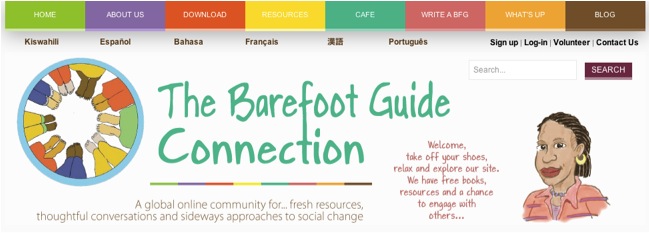Are there alternatives to the cynicism and disillusionment that pervades in so many organizations that are working towards ‘development’? Where are the people who are interested in creating more grounded, creative, human and humble ways of doing this work?
You can find them here.
When I first picked up and started reading The Barefoot Guide to Working with Organisations and Social Change almost four years ago, it was one of those strike-you-through-the-heart moments. Finally, someone had given voice to what I considered my role to be as someone working in aid and philanthropy. Finally, someone was talking about authentic leadership and how to make it more possible for ordinary people to acquire more power over the choices and decisions that affect their lives.
And more importantly, they were talking about my role in it.
This was very different than the conversations I’d been having about reports and strategic frameworks and research proposals. These were pre-how-matters days and upon finishing the Barefoot Guide, I sent it to all my colleagues, printed out the pictures to decorate my office walls, and made readings from it part of our team meetings.
I don’t think I’m the only one who felt this immediate kinship. The Barefoot Guide has now been downloaded well over 50,000 times as a vital resource in enriching development practice. Two popular Barefoot Guides have already been produced. Four translations currently exist and five more are nearing completion. Two more Barefoot Guides are in the works.
All of this flurry of activity, which had been happening via listserves and emails between a global team of seasoned practitioners across many organizations, has moved to a home on the web, The Barefoot Guide Connection, where all of us can join in.
Among the many great online communities focused on aid, The Barefoot Guide Connection is invites practitioners who are interested in a genuinely ‘developmental’ approach to their work. The following excerpt from The Barefoot Guide shows what this means:
***
The authors of The Barefoot Guide offer four “guides” that we have found to be particularly true and useful in our work.
1) Development (and the will to develop) is a natural, inborn process.
In whichever state we may ?nd organisations, they are already developing. They may or may not be developing healthily or in ways they like or are even conscious of, they may be stuck in some places, but they have been developing long before facilitators came into their lives and will continue to do so long after they have left. We cannot deliver development – it is already happening as a natural process that we need to read, respect and work with.
2) People’s and organisation’s own capacity to learn from experience is the foundation of their development, independence and interdependence.
Learning from experience is as old as the hills, one of the natural, organic processes, though seldom used consciously, by which people develop themselves. We learn by doing, by thinking about what we have done and then doing it a bit better next time. We also learn especially well from peers, horizontally, who share with us their experience, connecting it to our own experience.
Learning how to learn effectively, from own experience, enables people to take pride in their own intelligence and knowledge and to build a healthy independence from outside experts.
3) Development is often complex, unpredictable and characterised by crisis.
What does it take, and how long, to help a woman in crisis to ?nd her courage to deal with an abusive husband or for a community to ?nd the con?dence to deal with corrupt councillors? When an organisation seems to be on the verge of imploding is this the end or a chance for renewal? What complex and unanticipated development of forces contributes to a once-?ourishing social initiative rolling over and dying?
Development is inherently unpredictable and prone to crisis. Yet almost miraculously, developmental crises are pregnant with opportunities for new movement, for qualitative shifts.
Practitioners or donors often avoid offering support in times of crisis, thinking it signals failure, when the opposite may be possible. Recognising and working with crisis, with all its unpredictabilities, are central to a developmental approach.
4) Power is held and transformed in relationships.
We live, learn and develop within three kinds of relationships: relationship with self, interpersonal relationships with people around us and external relationships with the rest of the world. Power is held in relationships, whether it is the struggle we have with ourselves to claim our inner power, or the power some have over others or the power we hold with others, or the power the State wields in relation to its citizens – without relationship power means little, it has no force, for bad or for good. If we want to shift power, we have to shift relationships.
***
Come join and explore The Barefoot Guide Connection with me! (I’m excited to follow the blog and I’m planning to jump in the Café to discuss, “Has the word ‘learning’ become overused?” Right up my alley.) The site is a hub for the sharing of questions, frustrations, possibilities, and resources—something all of us working in development can use.
***
Related Posts
RCTs: A band-aid on a deeper issue?
Would YOU fund this organization?

